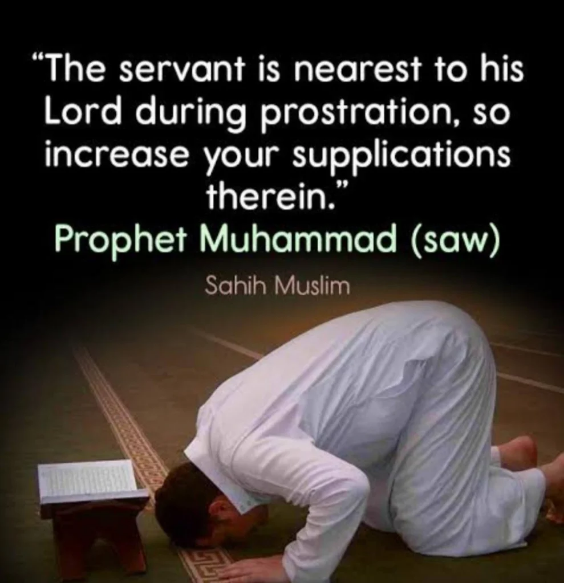
Surah Al-Alaq is a Meccan Surah with nineteen verses. Alaq means The Clot. The Surah is so entitled after the word alaq used in the second verse.
This Surah has two parts: the first part consists of from verses 1-5, and the second of from verses 6-19.
About the first part a great majority of the Islamic scholars are agreed that it forms the very first Revelation to be sent down to the Prophet pbuh.
The second part was sent down afterwards when the Prophet pbuh began to perform the prescribed Prayer in the precincts of the Kabah and Abu Jahl tried to prevent him from this with threats. Half of this surah is dedicated to such a wretched person Abu Jahl who lied against the Prophet pbuh after all evidences had been presented to them.
This Surah highlights the beginning of Revelation. Allah’s final Messenger came after a long dark age. The last messenger before Muhammad pbuh was Esa a.s and the gap between them was approximately 600 years. This period in which humanity was in complete darkness was lifted with the arrival of the ultimate revelation.
In a long narration, narrated by Aisha r.a, Bukhari and Muslim the beginning of the revelation is described. Aisha r.a said that it began by the Prophet pbuh seeing dreams that would come true and manifest exactly as he saw it in his dreams. This is almost as if he was being prepared for the message. Solitude then became beloved to him and he would spend many nights alone in the cave of Hira away from people almost as if he wanted to wash off the evil influences of Makkan society. And until that these very first verses were revealed to him.
The last part of Surah was revealed when the Prophet pbuh began to perform the Prayer in the Islamic way in the Kaba and Abu Jahl threatened and tried to prevent him from that. It so happened that after his appointment to Prophethood even before he could start preaching Islam openly, he began to perform the Prayer in the precincts of the Kaba in the way Allah taught him; and from this the Quraish felt for the first time that he had adopted a new religion. The other people were watching it with curiosity, but Abu Jahl in his arrogance and pride threatened the Prophet pbuh and forbade him to worship in that way in the Kaba. The Surah highlights the destiny of such evil mentality.
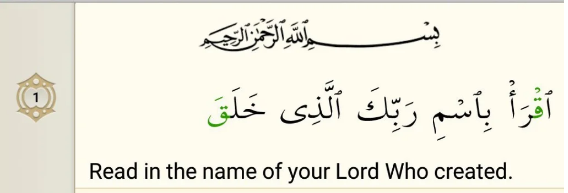
The revelations to the Prophet pbuh began in the form of true dreams. Whichever dream he saw it seemed as though he saw it in broad daylight. Afterwards solitude became dear to him and he would go to the Cave of Hira to engage in worship there for several days and nights. This was some kind of worship which he performed, for until then he had not been taught the method of performing the Prayer by Allah. He would take provisions with him and stay there for several days, then would return to Hazrat Khadijah who would again provide for him for a few more days. One day when he was in the Cave of Hira, Revelation came down to him unexpectedly and Jibreel a.s said, to him: “Read”.
The Hadith narrates the words of the Prophet himself, to the effect, “I said: I cannot read! There upon the Angel took me and pressed me until I could bear it no more. Then he left me and said: Read. I said: I cannot read! He pressed me a second time until I could bear it no more. Then he left me and said: Read. I again said: I cannot read! He pressed me for the third time until I could bear it no more. Then he left me and said: Iqra bismi Rabbi kal- ladhi khalaqa: (Read in the name of your Lord Who created) till he reached ma lam ya lam (what he did not know).
Then the Prophet pbuh returned home to Hazrat Khadijah trembling with fear, and said to her: ‘Cover me, cover me’, and he was covered. When terror left him, he said: ‘O Khadijah, what has happened to me?’ Then he narrated to her whatever had happened, and said: I fear for my life'. She said;No never! Be of good cheer. By God, never will God debase you: you treat the kindred well, you speak the truth, (one tradition adds: you restore what is entrusted to you), you bear the burden of the helpless, you help the poor, you entertain the guests, and you cooperate in good works.’ Hazrat Khadija inquired from her cousin Waraqah bin Naufal about the matter who was knowledgeable at Gospel & he sensed that Prophethood was bestowed upon Muhammad pbuh.
Even until a moment before coming of Jibreel a.s to the Prophet pbuh was without any expectation & he had no idea that he was going to be appointed a Prophet. Coming down of the Revelation and appearing of the Angel face to face was an unexpected accident for him, the first effect of which on him was precisely the same as could naturally be on a person meeting with such a tremendous experience, in the absence of any preparation. That is why when he proclaimed the message of Islam, the people of Makkah raised all sorts of objections, but no one said that they were already apprehending that he would make a claim, for he had been making preparations since long to become a Prophet.
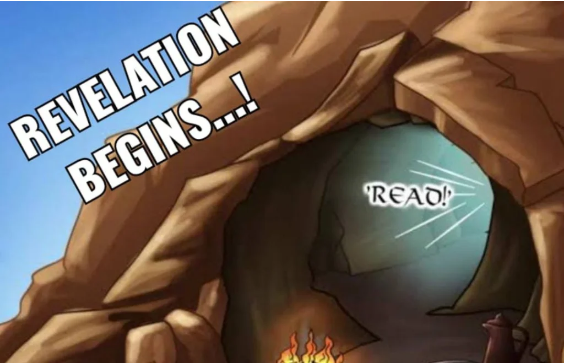
The verse addresses the Prophet pbuh and says, “Read (Proclaim)! In the Name of your Lord Who created”, which means Read in the name of the Lord, Who is the Creator, Who created the whole universe and everything in it.
Allah emphasizes on His Lordship and we know that Rabb means a ‘reformer, the one Who is both the master and the cherisher. Then, to establish the Lordship of Allah, it emphatically refers to the ‘creation and the existence of this universe’, because the best reason for His Lordship is, His Creative attribute. The One Who runs and sustains the universe is its Creator. What did He create? There is no mention meaning there is no limit to it.
This is, indeed, an answer to the pagan Arabs who had accepted the creative power of Allah, but, they assumed the lordship and device of this world for their own idols and gods. Besides, the Lordship of the Lord and His creation in this World, are the best evidence for proving His Being. Then, amongst all the creatures of the world, it emphasizes on the best and the most important of them, i.e. Man! And through the first revelation Allah wanted man to read, to know, to get to the purpose!
The first word chosen by Allah to be communicated to humanity was ‘Read’. This book, the Quran, that Allah gave in the form of oral transmission became the mother of books more than any other in history. It was a Book form in Lohe-Mahfooz, then transmitted to Prophet pbuh verbally, and finally again took form of Book in this dunia so Allah wisely chose the word Read in this verse. Because it’s always a text that is to be read, not speech. A life time reminder and guidance for humanity!

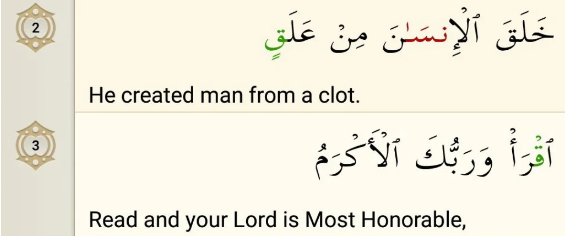
After making mention generally of the creation of the universe and all, now Allah talks of man in particular, saying how Allah made him a perfect man starting his creation from an insignificant and humble state i.e. from Alaq. The term alaq is plural of Alaqah, originally means ‘to adhere/cling to something’, and hence, some congealed blood which sticks to the body, is called alaq.
Since the life-germ, in the course of its first processes until it becomes a foetus, changes to a type of sticking clot which is apparently very worthless, it is indeed, the basic origin of the creation of Man, then it makes the power of Allah clear that it is He Who is able to create such a worthy creature from such a lowly unworthy thing. At the time of the advent of Islam these facts were not known to Man, but the Quran, as a scientific miracle, unveiled the true meaning.
Then again the term Iqra is emphasized, when the Prophet pbuh said he can not read, the upcoming verses again stressed to read meaning: ‘you can read (proclaim) because of the extreme graciousness and the extraordinary generosity of your Lord’. Allah says Iqra a second time with the purpose of encouraging the Prophet pbuh to read – almost like a pat on the back.
It is a great favor of Allah that starting man’s creation from a most insignificant state He made him possessor of knowledge which is the noblest attribute of creation.
After reminding us of our humble origins from a clot, Allah mentions His nobility and how He is the most noble of all. Making the Prophet pbuh read is a gift, an act of nobility from Allah, which strengthens him. Later on in the Surah we find that Abu Jahl humiliates the Prophet pbuh and at that time it becomes important for the Prophet pbuh to remember why he was reciting this. It was because his Noble Lord gave him nobility by choosing him, above all else, to be the one to recite these words, words that gave him strength in his times of difficulty.
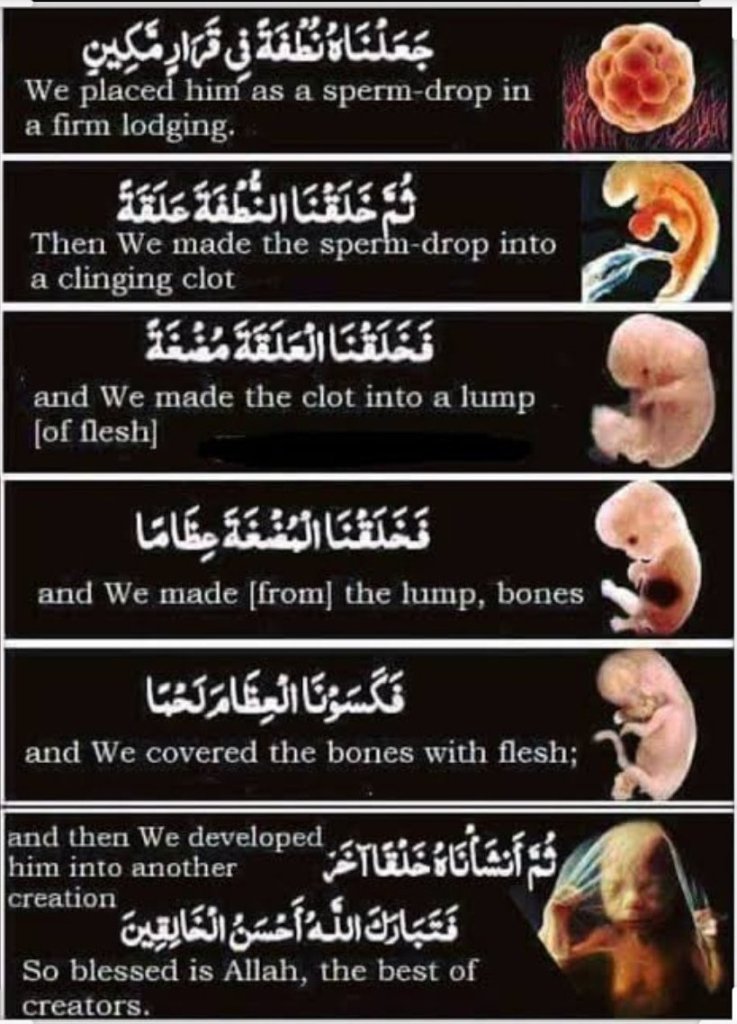
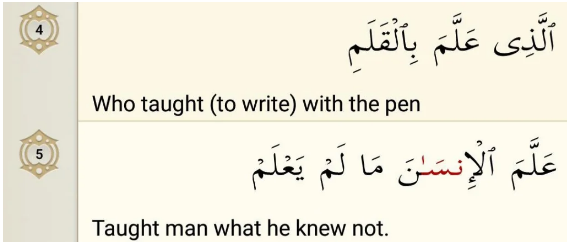
Allah here honours the pen and made it a means by which knowledge is preserved & delivered. Allah not only made man possessor of knowledge but also taught him the art of writing by the use of pen. It is the pen which became the means of propagation & preservation of knowledge. Had Allah not given man this art of pen (by inspiration), his intellectual faculty would have no opportunity to develop, expand and become a means of transmission of knowledge from one generation to the next & make mankind reach the Divine message.
So man originally was absolutely illiterate. Whatever knowledge he obtained, was actually a gift from Allah. Whatever doors of knowledge at any stage did Allah will to open for man, they went on opening up before him, both divine and worldly.
Whatever man looks upon as his own scientific discovery was, in fact, unknown to him before. Allah gave him its knowledge whenever He willed without his realizing that Allah by His grace had blessed him with the knowledge of it. And The Knowledge of Unseen (ghaib) could also have never attained by man unless Allah gave it to us through His Revelations.
Allah has thus said iqra (read) twice and alam-ma (learn) twice. Thus, in the beginning of the surah there is a strong emphasis on learning and teaching. The opening theme by Allah to humanity!
‘Whoever takes up a path in which he is trying to acquire knowledge, Allah will facilitate for him a road to jannah’.
(Interpretation of Hadith)
These verses were the very first to be revealed to the Prophet pbuh, and the first experience was so intense & tremendous that the Prophet pbuh could not bear it any more. Therefore, at that time he was only made aware that the Being Whom he already knew & acknowledged as his Lord was in direct communion with him, had started sending down Revelations to him, and had appointed him as His Prophet. Then after an intermission the opening verses of Surah al-Muddaththir were revealed in which he was told what mission he had to perform after his appointment to Prophethood.

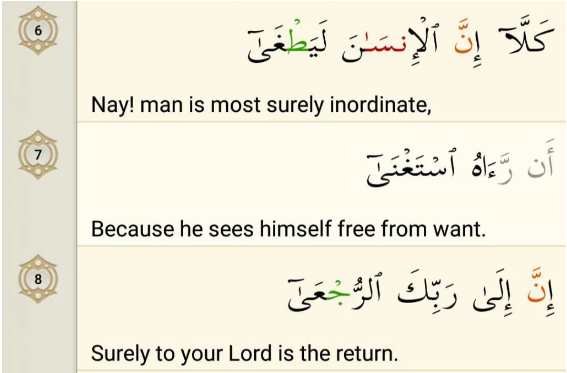
Following the last verses in which some material and spiritual gifts of Allah bestowed on Man were mentioned, that which demands his gratitude and absolute submission to Him, here Allah says that indeed man behaves rebelliously for he thinks himself to be self-sufficient, and although towards your Lord indeed is the return.
This is the nature of most human beings, the nature of those who are not acquainted with revelation and are not trained wisely that, when they think they are self-sufficient, they rebel. As man by nature doesn’t approve of any authority over him unless guided rightly.
Although all of our knowledge and capacities come as gifts from Allah, Man, in his inordinate vanity and insolence, misinterprets Allah’s gifts as his own achievements. So, he neither obeys Him nor follows His guidance, nor pays attention to his conscience, nor observes the right and justice.
Not only Man, but, also, no creature will be self-sufficient and free from the help of Allah. All of them are always in need of His Grace and His blessings. If His Mercy stops for a moment, just at the same time, all will be destroyed. Man sometimes makes mistakes and as the verse points out, thinks himself self-sufficient.
These verses also serve as a message for Prophet pbuh that he should not expect that all people will accept his invitation easily, but he should be prepared to be opposed by the denial and enmity of the transgressors and know that the road in front of him is full of ups and downs.Then, warning the rebels, it says that verily, to your Lord is the return!
And it is Allah Who punishes the transgressors for their deeds. Originally, just as the return of all is to Him and everything has also been from Him, from the beginning then, it is not reasonable for Man to think that he is self-sufficient and to become bold and rebel.
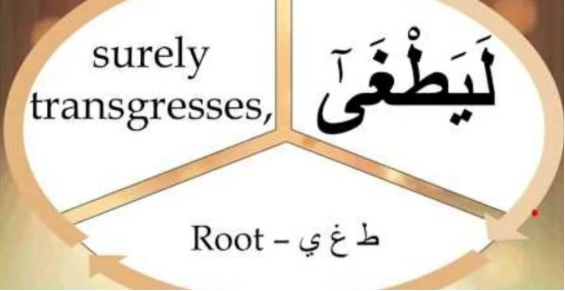
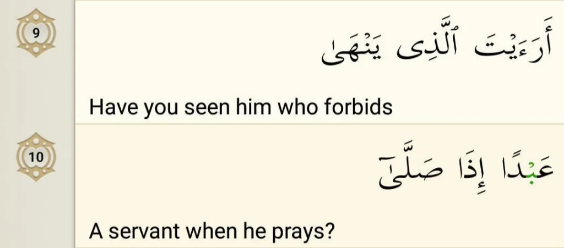
This second part of Surah was revealed when Prophet pbuh began to perform the Prayer in the Kaba and Abu Jahl threatened and tried to prevent him from this. The Quraish felt for the first time that he had adopted a new religion. The other people were watching it with curiosity, but Abu Jahl in his arrogance threatened the Prophet pbuh and forbade him to worship in the Kaba.
Abu Jahl asked the people of Quraish: “Does Muhammad set his face on the ground before you? “When they replied in the affirmative, he said: “By Lat and Uzza, if I ever catch him in that act of worship, I would set my foot on his neck and rub his face in the dust.” Then it so happened that he saw the Prophet pbuh in that posture and came forward to set his foot on his neck, but suddenly turned back as if in a fright and being asked what was the matter, he said there was a ditch of fire and a terrible apparition between himself and Muhammad and some wings. On hearing this the Prophet pbuh remarked: “Had he come near me, the angels would have smitten and torn him to pieces.” (Ahmad, Muslim)
Allah uses the word Abd for Prophet pbuh which shows that it is a special style of love by which Allah makes mention of His Messenger pbuh in His Book. Besides, it also shows that Allah after appointing His Messenger to Prophethood had taught him the method of performing the Prayer
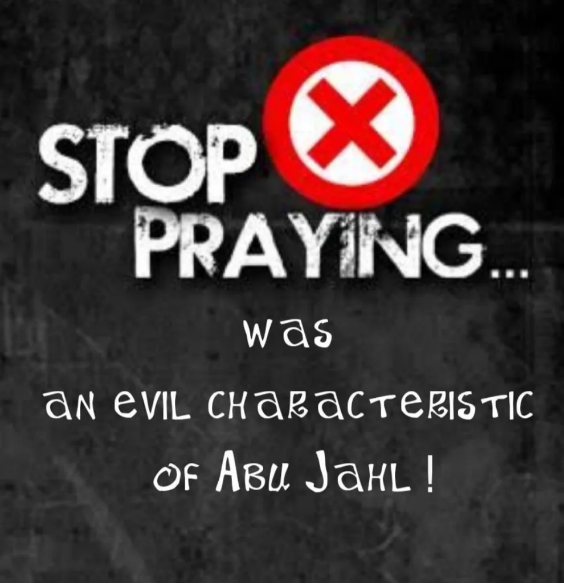
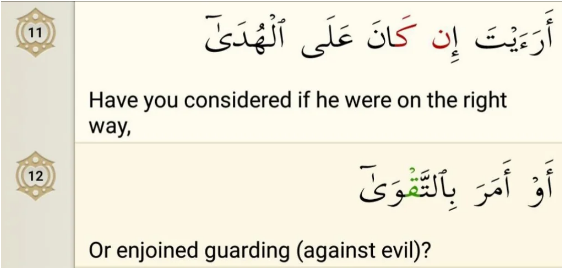
To show further emphasis on such a chatacter who stops others form Allah’s worship, Allah further explains,
“Have you seen whether he is on (the road of) Guidance? Or enjoins piety?”
Is it right for him (a man such as Abu-Jahl) to forbid? Can the punishment of such a man be anything but the fire of Hell? As he had the capacity to turn to good and be helpful for Islam but he chose the wrong direction and caused destruction to the mission of Prophet pbuh, as if he never could be on the road to guidance and piety.
The audience here apparently is every just man, who is being asked: Have you watched the act of the person who prevents a Servant from God’s worship, accepts no guidance and enjoins piety? What do you think: if the Servant be rightly guided, or warning the people to fear God and refrain from evil, and this wretched person be denying the Truth and turning away from it, what will his act be like?
Could this man adopt such an attitude had he known that Allah is watching the man who is exhorting others to piety as well as him who is denying the truth and turning away from it? Allah’s watching the oppressor and his wrongdoing and the oppressed and his misery by itself implies that He will punish the oppressor.

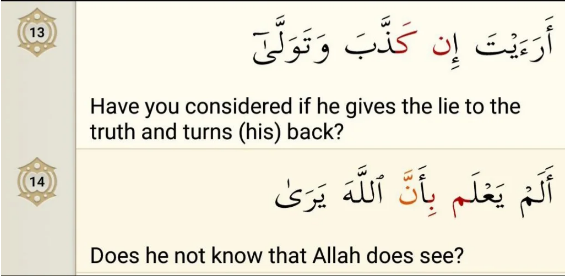
This is extension of the previous verses about evil traits of Abu Jahl. This cursed man had potential to accept the Truth as he could see clear signs already but had he only realised that potential. Instead he turned bad and now Allah asks can’t you see the harm and destruction that he will bring about as a result?
Abu Jahl thinks he is only violating the Messenger pbuh. However, he has gone so far astray that the thought that Allah is watching him did not occur to him. This is important because, like most mushrikeen, he knew a God exists. This is the attitude of a person who becomes such a deviant criminal that he does not care anymore. A person so evil that even when his victim invokes the name of Allah, he does not stop to think twice about this plea. In the first passage of this surah Allah said that He taught the human what he did not know. One thing that man is taught here is that Allah is always watching. A criminal will be dissuaded from carrying out his crime if he thinks he is being watched.
Allah taught the human that he is being watched. If man truly appreciated this fact he would not engage in immoral, illegal and indecent behaviour. The one who indulges in sin, even Muslims, should reflect on this fact and internalise it so that they become fully cognisant of Allah at all times.

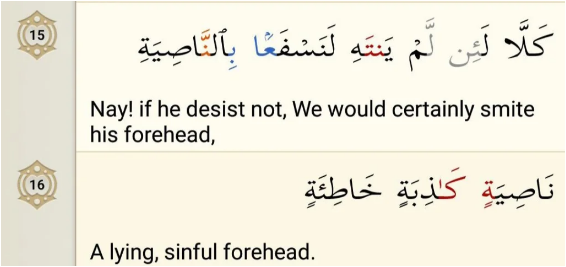
Here Allah warns of the consequences of rejecting the Divine knowledge. Allah comes to the Prophet’s pbuh defence Himself by informing him that there will be consequences if Abu Jahl does not stop. If Abu Jahl dares to continue then he will be grabbed and dragged by the forelock (lock of hair on the forehead). The word safa’a means to grab something and to pull it so hard that it comes out of its roots. Like it is usually an animal that is grabbed from the front when its owner is angry (e.g. horse’s mane).
The forelock or forehead in Arab tradition was the place of one’s pride and dignity and even in our times today we can appreciate this, which is why people wear hats and turbans as a mark of honour and respect. It is a place where the mind and knowledge rests and it is of course the knowledge presented in this Surah that Abu Jahl rejects and so it is fitting that he is dragged by the forehead. Two things led him to disbelief, his ignorance and his arrogance. His ignorance to the message and his arrogance which led to his rejection of it. This could also mean the scene on the Day of Judgement when some people will be dragged by their forehead and others who lived righteous lives will walk upright.
Allah uses two adjectives to describe Abu Jahl’s forehead, lying and sinful. Allah firstly calls it a lying forehead. This is an insult and a humiliation for one of the leaders of the Quraish and it is important to appreciate the political ramifications of this. Allah exposed Abu Jahl as having already accepted that this was the truth internally and that he refused to humble himself, making him sinful.
The word khaati’ah means to make a mistake whose consequences one does not know. Abu Jahl rejected and attacked the Messenger pbuh without being able to appreciate the consequences, which is an extremely painful punishment awaiting him.
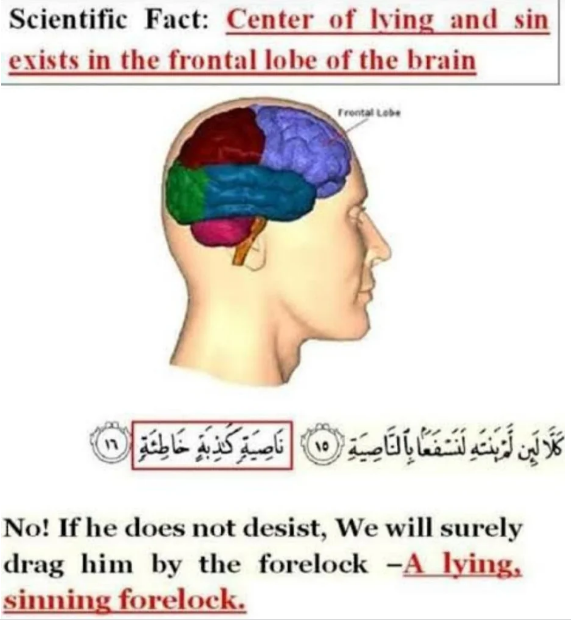
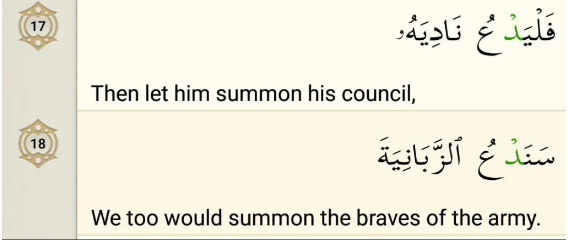
Allah now comes back to this life and issues Abu Jahl a challenge. When the Prophet pbuh rebuked Abu Jahl on his foolish behavior, he had retorted: “O Muhammad, on what strength do you threaten me? By God, my supporters in this valley far exceed yours in number.” At this it is being said: “Let him call his band of supporters.” Abu Jahl used to sit in such a public place with his entourage. Allah is telling the Messenger pbuh to tell Abu Jahl to call the people he calls upon.
Zabaaniyyah is the plural of zibniya which means a security guard and the word zabana means to protect and guard something with force such that if someone tries to break out they will be attacked. Allah says you call your gang and I’ll call my guards. Thus, on one hand there are gangsters and thugs and on the other is Allah’s security force. There is no contest. Furthermore, we know this happened in the incident where Abu Jahl ran back from his attempt to stomp on the Prophet’s neck after Allah released his army. Therefore, what Allah means is: “Let him call his supporters; We too shall summon Our Police, i.e. the angels of torment, to deal with him and his supporters.”


The Prophet pbuh was engaged in the work of giving dawah, despite this he faced constant animosity towards his noble efforts. It is demoralising being physically and verbally abused like this. Thus, at the end of this surah Allah disregards Abu Jahl and turns to talk to his Messenger pbuh. Almost like Allah is saying don’t worry about him (Abu Jahl), this man is not a big deal, don’t stress. Allah tells the Prophet pbuh not to pay any attention to Abu Jahl. Rather, he should focus at his mission and prostrate and come close to Allah.
“Sajdah” (prostration) here implies the Prayer, so as to say: “O Prophet, continue to perform your Prayer fearlessly as you have been in the past, and seek your Lord’s presence through it.”
Hadith narrated in Muslim,
“The servant is nearest to his Lord when he is in the state of prostration.”
When the Prophet pbuh recited this verse, he performed a sajdah of recital. So Allah basically teaches us to come close to Him by making sajdah to Him and stay focused.
